

What is Job Satisfaction and Why is it Important? Have you asked yourself lately if your job is right for you?
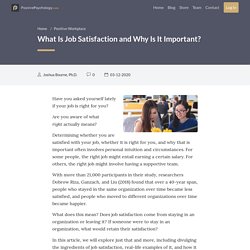
Are you aware of what right actually means? Determining whether you are satisfied with your job, whether it is right for you, and why that is important often involves personal intuition and circumstances. For some people, the right job might entail earning a certain salary. For others, the right job might involve having a supportive team. With more than 21,000 participants in their study, researchers Dobrow Riza, Ganzach, and Liu (2018) found that over a 40-year span, people who stayed in the same organization over time became less satisfied, and people who moved to different organizations over time became happier.
What does this mean? In this article, we will explore just that and more, including divulging the ingredients of job satisfaction, real-life examples of it, and how it relates to motivation. What Is Job Satisfaction? Choose a job you love, and you will never have to work a day in your life. Confucius 1. 2. 3. 4. 5. 6. 7. The Power of Corporate Wellness Coaches (& Where To Find Them) A Corporate Wellness Coach is a health coach who is brought into a facility or corporate office to help people either improve or maintain their health.
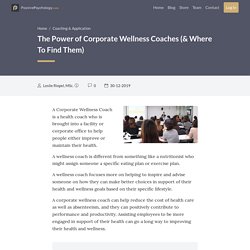
A wellness coach is different from something like a nutritionist who might assign someone a specific eating plan or exercise plan. How Do You Create Happier Employees? Let’s face it managing people can be tough, and despite your best efforts your people may be part of the growing numbers who feel disengaged from their jobs.
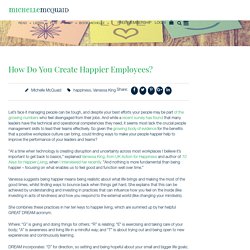
And while a recent survey has found that many leaders have the technical and operational competencies they need, it seems most lack the crucial people management skills to lead their teams effectively. So given the growing body of evidence for the benefits that a positive workplace culture can bring, could finding ways to make your people happier help to improve the performance of your leaders and teams? Why Wellbeing Programs Fail. Despite your best intentions and efforts are your wellbeing programs falling short of the long-term outcomes you hoped to achieve?
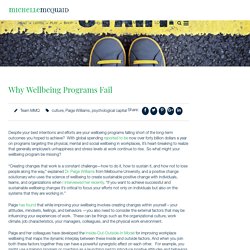
With global spending reported to be now over forty billion dollars a year on programs targeting the physical, mental and social wellbeing in workplaces, it’s heart-breaking to realize that generally employee’s unhappiness and stress levels at work continue to rise. So what might your wellbeing program be missing? “Creating changes that work is a constant challenge—how to do it, how to sustain it, and how not to lose people along the way,” explained Dr.
Paige Williams from Melbourne University, and a positive change solutionary who uses the science of wellbeing to create sustainable positive change with individuals, teams, and organizations when I interviewed her recently. Can Wellbeing Be Improved At A Systems Level ? Do you struggle sometimes to maintain your wellbeing?
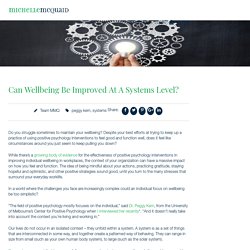
Despite your best efforts at trying to keep up a practice of using positive psychology interventions to feel good and function well, does it feel like circumstances around you just seem to keep pulling you down? While there’s a growing body of evidence for the effectiveness of positive psychology interventions in improving individual wellbeing in workplaces, the context of your organization can have a massive impact on how you feel and function. The idea of being mindful about your actions, practicing gratitude, staying hopeful and optimistic, and other positive strategies sound good, until you turn to the many stresses that surround your everyday worklife.
In a world where the challenges you face are increasingly complex could an individual focus on wellbeing be too simplistic? “The field of positive psychology mostly focuses on the individual,” said Dr. Our lives do not occur in an isolated context – they unfold within a system. 5 Ways to Flourish at Work. Can Organizations Help People Thrive? Being Happy at Work Matters. People used to believe that you didn’t have to be happy at work to succeed.
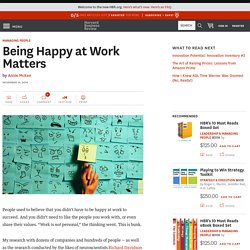
And you didn’t need to like the people you work with, or even share their values. “Work is not personal,” the thinking went. This is bunk. My research with dozens of companies and hundreds of people — as well as the research conducted by the likes of neuroscientists Richard Davidson and V.S. Ramachandran and scholars such as Shawn Achor — increasingly points to a simple fact: Happy people are better workers.
And yet, there is an alarmingly high number of people who aren’t engaged. The Gallup report also noted that employee engagement has remained largely constant over the years despite economic ups and downs. Disengaged, unhappy people aren’t any fun to work with, don’t add much value, and impact our organizations (and our economy) in profoundly negative ways. It’s time to finally blow up the myth that feelings don’t matter at work. But it’s not just negative emotions we need to watch out for.
Subjective Well-Being. Motivation at Work. Well-Being & Suffering At Work.
Happiness at Work: 10 Tips for How to be Happy at Work. How Can You Create a Positive Organization? 5 Happiness Workshop Activities That Boost Team Success. We all know that it’s hard to be creative and successful at work when we are feeling negative and stressed.
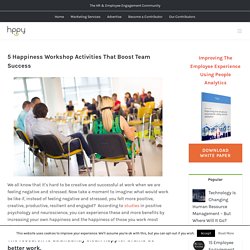
Now take a moment to imagine: what would work be like if, instead of feeling negative and stressed, you felt more positive, creative, productive, resilient and engaged? According to studies in positive psychology and neuroscience, you can experience these and more benefits by increasing your own happiness and the happiness of those you work most closely with. The research is abundantly clear: happier brains do better work. One way to maximize the happiness and productivity of your team is to specifically set aside time to apply research-based strategies. At Happy Brain Science, we have curated many activities that we facilitate in our workshop The Science of Being Happy and Productive at Work. Happiness Workshop Activity # 1 – Start Meetings with Recognitions Happiness Workshop Activity #2 – Go on a Walking One-on-One Happiness Workshop Activity #3 – Present Pecha Kuchas.
Podcasts.